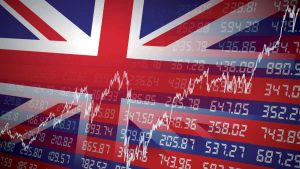“ ‘Many people have gotten so rich off this market, they think they’re invincible.’ ”
Jeffrey Bierman, TheoTrade’s chief market technician and an adjunct professor of finance at Loyola University Chicago, has seen momentum-driven stock markets before, but nothing, he says, like this.
“It’s like the Roaring Twenties,” Bierman says. “The market has become a gambling casino. It reeks of discretionary income.”
Bierman blames the unhinged market he sees squarely on algorithmic trading that insitutions, banks, hedge funds and Wall Street firms favor. This blisteringly fast, programmed buying and selling is designed to take equally quick profits — in, out, rinse, repeat.
Bierman notes how the dominance of the “algos” — as these high-speed programs are known — has created a momentum-based, one-direction market that is severely concentrated in a handful of well-known stocks, mostly technology names.
To say this is dangerous for long-term and mainstream investors is an understatement. “When those [momentum] stocks fall, they will bring the entire market down,” Bierman says. “I’ve been through four bubbles, and each time they feel worse. This one might feel the worst of all.”
In this recent MarketWatch interview, Bierman gives his take on the current market environment and explains why he believes this is one of the biggest market bubbles ever. He also shares names of stocks and sectors he believes will weather a coming U.S. market correction.
Says Bierman: “It’s not going to end well. When this charade ends, the rubber-band effect could be lightning fast and blinding.”
MarketWatch: The U.S. stock market seems unstoppable, doesn’t it?
Bierman: I call it the “Lifestyles of the Rich and Famous” market. Many people have gotten so rich off this market, they think they’re invincible. They think it’s easy to wake up every morning and make money by buying any tech stock, then head out for a massage and tennis at the club. It’s like the Roaring Twenties. The market has become a gambling casino. It reeks of discretionary income supported by the wealth effect.
MarketWatch: What type of investment strategy would you use in this market?
Bierman: If the S&P 500
SPX,
drops to 3,800 or lower, I’d be a buyer. I want to buy when there is “blood in the streets.” Right now, there is no blood. This market has been grinding higher for months in a perfectly manicured channel. It’s emblematic of algorithmically driven markets. … It’s extremely one-sided. One-sided markets are very dangerous once they reverse.
MarketWatch: What stocks are the algos buying?
Bierman: They are buying what’s being called the “Magnificent Seven”: Apple
AAPL,
Microsoft
MSFT,
Alphabet
GOOGL,
GOOG,
Meta Platforms
META,
Amazon
AMZN,
Netflix
NFLX,
and Nvidia
NVDA,
These stocks are part of a larger orbit of 75 technology stocks that are also being pulled higher. The institutional players are forcing momentum to the upside primarily using these seven stocks.
“ ‘When this market turns, the speed and magnitude of the drop will be jaw-dropping.’ ”
MarketWatch: What’s wrong with momentum buying?
Bierman: First, algo traders are primarily using extremely high-speed trading strategies, meaning they are in and out of a trade in microseconds for quick profits. Second, because the market is so momentum- and algo-driven, when this market turns, the speed and magnitude of the drop will be jaw-dropping. It will likely punish the market beyond conventional expectations.
MarketWatch: The S&P 500 is at 52-week highs. Do you buy at the market highs?
Bierman: No. The market is dangerously overbought right now. It’s too risky to buy at these highs because it is detached from traditional valuation metrics and has priced in little to no risk to the downside.
Read: ‘Overbought does not mean sell.’ Stock bulls and this market have room to run.
Don’t miss: Jeffrey Bierman says these five synchronized assets are pointing to a ‘black swan event.’
MarketWatch: What are you personally buying in this market?
Bierman: I bought oil stocks, including APA Corp.
APA,
Devon Energy
DVN,
and Dominion Energy
D,
I also love Pfizer
PFE,
and Bristol Myers Squibb
BMY,
and I’ll buy more of it. I also like AT&T
T,
and Verizon
VZ,
because of their consistent earnings and generous dividend yields. The market’s disdain for these stocks is obvious because they are not high-beta, high-octane stocks. They are defensive plays that should gain traction once the next correction takes hold.
MarketWatch: How do you see this rally ending?
Bierman: It’s not going to end well. When this charade ends, the rubber-band effect could be lightning fast and blinding. The time to hedge is now before the fireworks begin. Right now, the VIX
VIX,
is trending near a multiyear low, suggesting that investors are too complacent. It’s the greed and hope strategy: Buy at the high and hope that it goes up the next day.
However, if stocks gap down dramatically, most traders will get blindsided. They will realize they never should have gotten in at the 52-week high. We have overshot way worse than nearly any time in the last 10 years. It’s extremely dangerous.
“ ‘When the algo-fueled rally stops working, the S&P 500 could go down 400 or 500 points in a few days.’ ”
MarketWatch: Can you be more specific on how bad conditions could get?
Bierman: I don’t want to sound like Doctor Doom but when the algo-fueled rally stops working, the S&P 500 could go down 400 or 500 points in a few days. Without hedges and low liquidity, this market could blow a lot of traders and investors out.
MarketWatch: What about using short-selling strategies?
Bierman: It’s still quite risky to short this market because of the “adrenaline junkies” who are rushing to buy call options at the start of the market each day. Until there is a turn in the technicals, which hasn’t happened yet, this market can conceivably levitate higher. The machines have taken over the stock market so nothing matters except what the algos can chase higher. They can do it much faster than humans. We’re in a bad place right now: It’s too late to buy, but it’s too early to short.
Read: Why you shouldn’t try to time the stock market
MarketWatch: Do you have any positions in your personal portfolio besides the stocks you mentioned?
Bierman: I own 30-year Treasurys
TMUBMUSD30Y,
and CDs that pay 4%. The reason I am so light on equities is that I am scared by the lack of people in this market. The market is highly machine-driven; it appears that there is little number crunching or risk management involved. I will not invest in a market where common sense has gone out the window. What does a machine know about what a stock is worth? It doesn’t. The algos effectively key off order flow and charts.
“ Pharmaceuticals, healthcare and financials are not in a bubble. ”
MarketWatch: Are you certain stocks are in a bubble?
Bierman: Yes, but not the entire market. Pharmaceuticals, healthcare and financials are not in a bubble, but certain technology stocks are in a bubble, and so is leisure. The Magnificent Seven stocks are in a bubble. When those stocks fall, they will bring the entire market down with a force and speed that investors have rarely witnessed in their lifetimes. There is no playbook for a market that is run by machines. Algos don’t have a soul or a brain and no risk filters. I’ve been through four bubbles, and each time they feel worse. This one might feel the worst of all because there is almost no volatility and comparatively thin liquidity.
MarketWatch: What could pop the bubble?
Bierman: I don’t know what is going to pop the bubble or when it will happen but I know that a market must be two-sided to work efficiently. When the bubble eventually bursts, it will be clear in hindsight. Most people will wish they had sold the stocks that had gone vertical.
MarketWatch: Is there anything positive about current market conditions?
Bierman: Yes. The good news is that the Magnificent Seven stocks are good companies but are priced out for the next five years. If you are patient and can wait for a major correction, you will have a chance to buy some great companies at really good prices. We’re not there yet, but eventually we will be.
Michael Sincere (michaelsincere.com) is the author of “Understanding Options” and “Understanding Stocks.” His latest book, “How to Profit in the Stock Market” (McGraw Hill, 2022), is aimed at advanced short-term traders and investors.
Also read:
This post was originally published on Market Watch






